Comparing Two 1TB NVMe Drives with Same NAND, Same Controller: XPG SX8200 Pro vs HP EX950
by Billy Tallis on February 6, 2019 11:30 AM ESTAnandTech Storage Bench - Heavy
Our Heavy storage benchmark is proportionally more write-heavy than The Destroyer, but much shorter overall. The total writes in the Heavy test aren't enough to fill the drive, so performance never drops down to steady state. This test is far more representative of a power user's day to day usage, and is heavily influenced by the drive's peak performance. The Heavy workload test details can be found here. This test is run twice, once on a freshly erased drive and once after filling the drive with sequential writes.
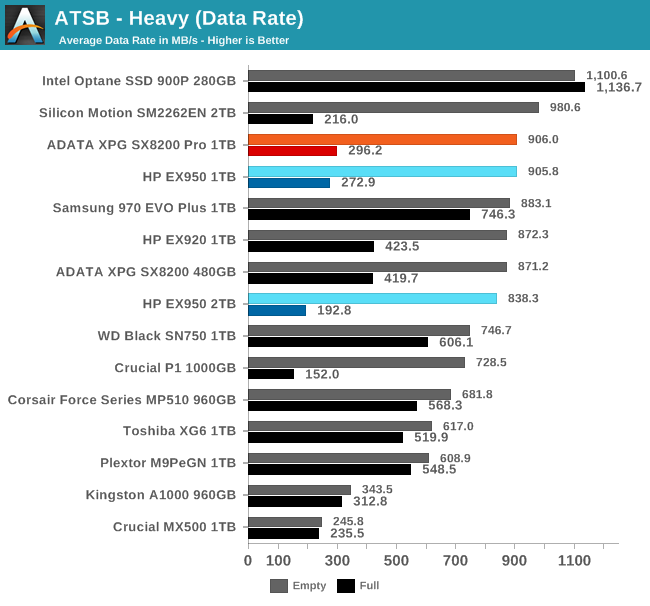
The Silicon Motion NVMe drives provide excellent overall performance when the Heavy test is run on an empty drive, but at the cost of much worse full-drive performance. This effect is not as strong for the 1TB models as for the 2TB HP EX950, which has also regressed overall from the performance of the pre-production firmware. The very slight gains the 1TB SM2262EN drives make over the HP EX920 in empty-drive performance do not come close to justifying the sacrifice in full-drive performance, especially since the SM2262 was already subpar in this respect.
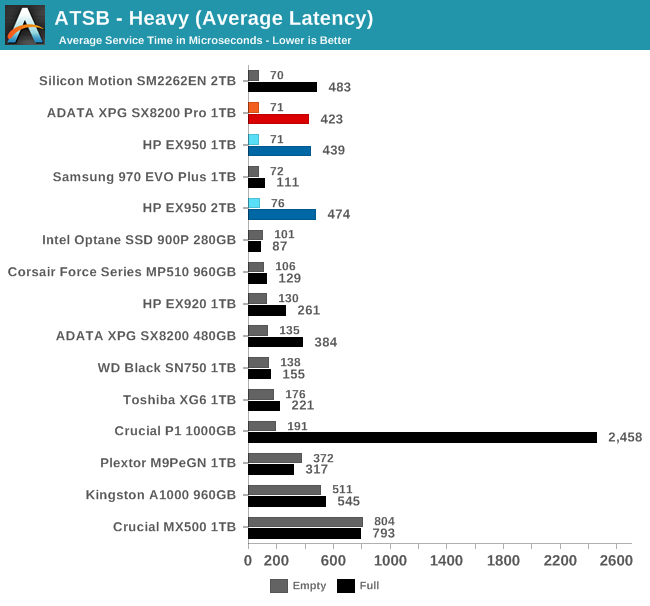
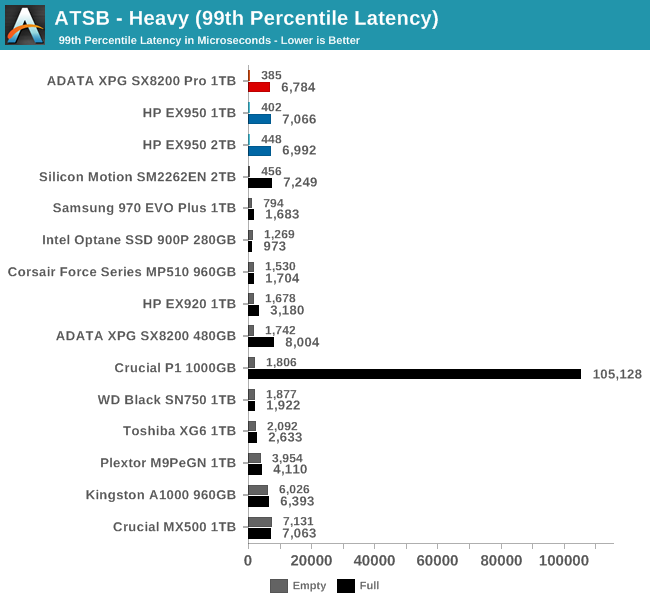
The average and 99th percentile latency scores from the SM2262EN drives are unrivaled when the Heavy test is run on an empty drive, but when the drives are full the average latency scores regress to low-end NVMe levels and the 99th percentile latency scores end up comparable to mainstream SATA drives.
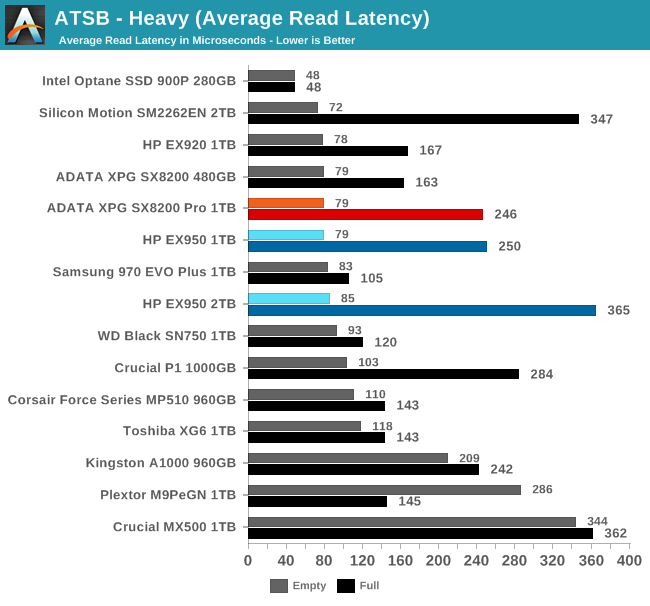
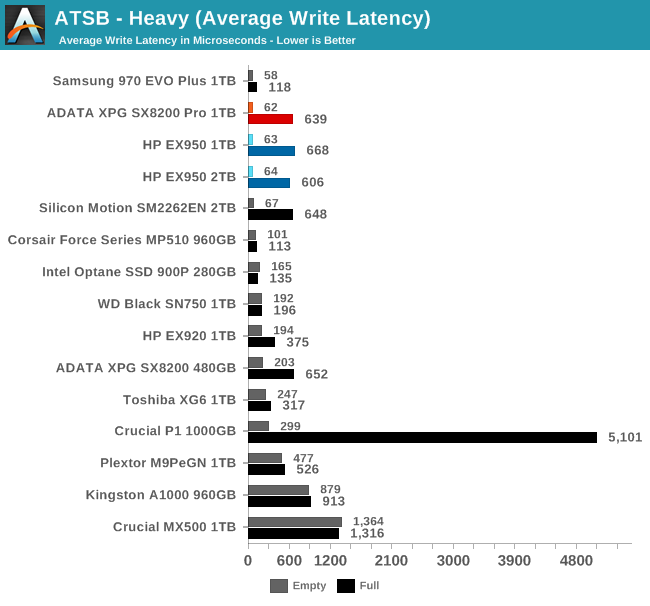
The best-case average read latency scores from the SM2262EN drives when the Heavy test is run on an empty drive are unchanged from the earlier SM2262 drives and remain among the best from any flash-based SSD. The empty-drive average write latencies are significantly faster than the older drives and are comparable to what Samsung's latest 970 EVO Plus provides. But as with the other metrics, performance on a full drive is not competitive with other high-end SSDs.
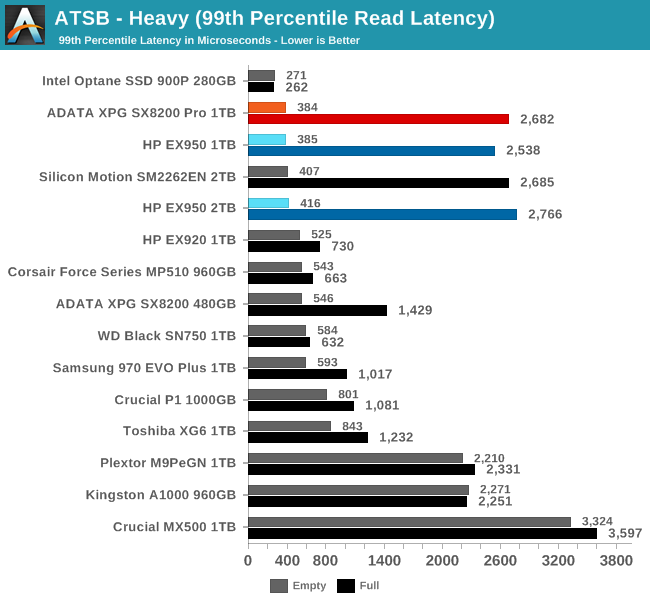
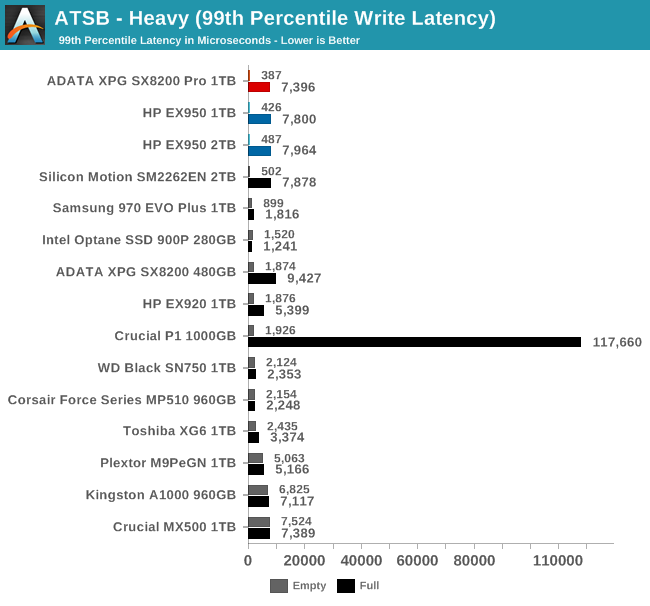
The 99th percentile read and write latency scores repeat the same story as above. Silicon Motion has optimized these drives for extremely good performance when they don't have much data to keep track of and can operate almost entirely from their SLC caches, but at great cost to worst-case behavior.
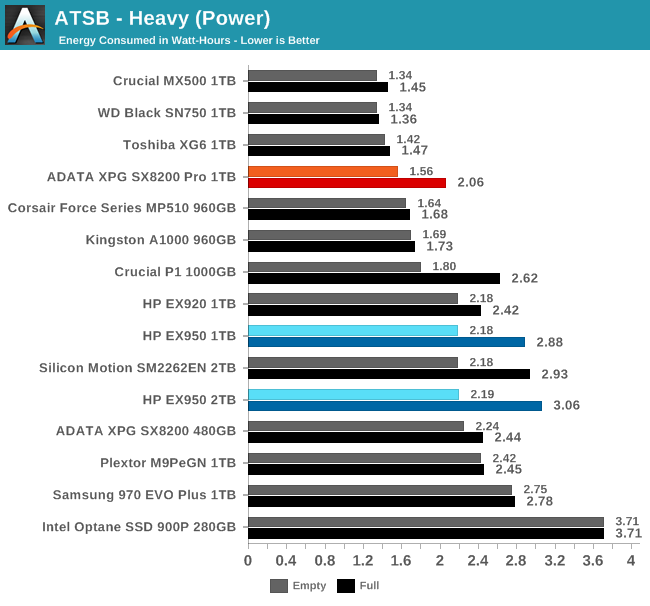
The ADATA SX8200 Pro again turns in much better power consumption scores than the HP EX950 or other SMI-based NVMe drives, but at its best it is still a bit more power-hungry than the WD Black and Toshiba's XG6. Due to the extreme performance drops when operating with a full drive, the SM2262EN drives all require much more energy to complete those test runs. That disparity in full vs empty energy efficiency is only matched by the QLC based drives like the Crucial P1 that also use a Silicon Motion controller and prioritize SLC cache performance.










42 Comments
View All Comments
wolfesteinabhi - Wednesday, February 6, 2019 - link
this is a bit of worrying trend where we are getting same products with new/updated firmware...the firmware that was essentially free earlier...and get improved performance...now they have to pay and buy new hardware for it.ERJ - Wednesday, February 6, 2019 - link
When is the last time you updated the firmware on your hard drive? RAID card / BIOS / Video Card sure, but hard drive?Now, you could argue that the controller is essentially part of the hard drive in this case but still.
jeremyshaw - Wednesday, February 6, 2019 - link
Hard drive? They aren't that old, right? You do remember HDD firmware updates. As for SSDs, I've recently updated the firmware on my SSDs. Heck, even my monitor has been through a firmware update. Like the SSD updates, the monitor firmware affected performance and compatibility.jabber - Thursday, February 7, 2019 - link
I used to worry about SSD firmware updates when I was getting in 1 every blue moon and it had novelty value but 200+ SSDs later I now just don't bother. At the end of the day getting an extra 30MBps just isnt the boost it was all those years ago.ridic987 - Wednesday, February 6, 2019 - link
We are discussing SSD's not hard drive. Literally the thing what he is saying most applies to.Samus - Thursday, February 7, 2019 - link
I agree, the lack of SSD firmware updates - particularly what WD has pulled with the Black SSD's - is troubling. To artificially limit product improvement through restricting software updates and requiring the user to purchase an entirely new product sets a bad precedent. They could at least do what HP does in the server market and charge for support beyond the warranty. After a server warranty is up (typically 3 years) you have to pay for firmware and BIOS updates for servers. This isn't a terrible policy, at least it wasn't until meltdown\spectre hit and all the sudden it seemed somewhat necessary to update server firmware that were many years old.Hard drives get firmware updates all the time - just not from the manufacturers. They typically applicable to retail products for reasons. But go ahead and look up a random OEM PC's drivers from Dell or HP and you might see various firmware updates available for the hard disk models those PC's shipped with.
Are they important though? Rarely. Barring any significant bug, hard disks have little to benefit from firmware updates as they are so mechanically limited and the controllers are generally quite mature, having been based on incremental generations of past firmware. This could all change as MAMR and HAMR become more mainstream, the same way the only hard disk firmware I remember being common were the WD Black2 (the SSD+HDD hybrid) and various Seagate SSHD's - for obvious reasons. The technology was new, and there are benefits to updating the SSD firmware as improvements are made through testing and customer feedback.
melgross - Thursday, February 7, 2019 - link
I think of it the other way around. Unless there’s a serious bug in the firmware, firmware upgrades are a gift, that manufacturers don’t have to give.The fact is that even when they are available, almost no one applies them. That’s true even for most who know they’re available. It’s alwasys dangerous to upgrade firmware on a product so central to needs. If there’s an unfounded bug in the new upgrade, that could be worse than firmware that’s already working just fine, but isn’t quite as fast as you might wish foe.
I’ve never seen any major upgrade in performance from a drive firmware upgrade. Ever.
FullmetalTitan - Thursday, February 7, 2019 - link
Those of us around for sandforce controllers remember well the pains of updating SSD firmware to make our drives useableDigitalFreak - Wednesday, February 6, 2019 - link
Billy - how far are we away from having 4TB M.2 NVMe drives?Billy Tallis - Wednesday, February 6, 2019 - link
Most SSD vendors could produce 4TB double-sided M.2 drives using off the shelf parts. Putting 4TB on a single-sided module would require either going with a DRAMless controller, stacking DRAM and the controller on the same package, or using 1Tb+ QLC dies instead of TLC.So currently any 4TB M.2 drive would have at least some significant downside that either compromises performance, restricts compatibility, or drives the price up well beyond twice that of a 2TB M.2 drive. There's simply not enough demand for such drives, and likely won't be anytime soon.